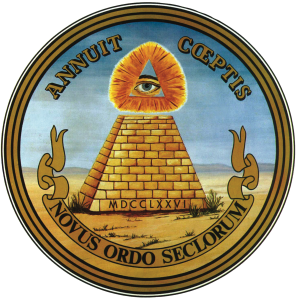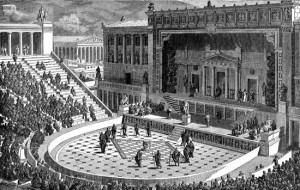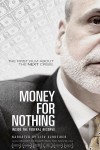By Paul Rosenberg, Freemansperspective.com

The following is a quote from a digital currency mailing list, posted at some time in the late 90s or early 2000s:
Consider that up to say 1970, people invented and developed Major Shit left, right and center. Jets, spacecraft, fiber, chips, laser… plastic… satellites… it goes on and on.
In contrast, the world’s done Absolutely Nothing for a good 20 years – at best, refinement. (“TV now has OVER 100 channels! and MORE PIXELS.”)
Indeed we presently live in a time of sort of… fantasy inventions. “Nanotech!” “Robots!” etc — all fantastic on paper, but totally nonexistent.
However flamboyant, this statement is true. Since 1970, there have been very few primary inventions. What we do have are mere improvements.
The Laws of Physics Are Old
Physics has gone almost nowhere since the 1960s. Here’s a short list of developments in physics:
Gravity: The laws were defined by Galileo and Newton in the 17thcentury.
Planetary motion: Defined by Kepler in 1609 and 1619.
Mechanics: The base laws were defined by Newton in the 17th century. Other specific laws were understood as far back as ancient times.
Gasses: Boyle defined his law of gasses in 1662.
Hydraulics: The laws and uses were developed between the 17th and 19th centuries.
Electromagnetism: James Clerk Maxwell defined these laws in 1865.
Relativity: Galileo defined the first laws of relativity in the 17th century; then Einstein defined new ones in 1905 and 1915.
Quantum mechanics: Einstein expanded upon the work of Max Planck and defined the quantum effect in 1905.
Atomic theory: The modern model of the atom was clarified by Neils Bohr in 1913.
Superconductors: Superconductivity was discovered by Heike Kamerlingh Onnes in 1911 and clarified by Fritz and Heinz London in 1935.
Quantum electrodynamics: Defined by Feynman, Tomonaga, and Schwinger in about 1962.
And what has physics done since then? Not a lot. Most visibly, physicists argue about theories that require twenty six dimensions and smash subatomic particles together.
In other words, physics has turned into a major yawn. Even the few exciting developments we have seen, such as cold fusion and high temperature superconductors, have gone nowhere. And exciting inventions like 3D printing, public cryptography, and cryptocurrencies have not only come from outsiders, but have been attacked by institutions.
Consider the major inventions that erupted between 1870 and 1970: railroads, telegraph, telephones, electricity, radio, TV, airplanes, cars, rockets, spacecraft, plastics, fiber optics, etc., etc., etc.
In the forty three years since – nearly half that time-span – what did we get?
That’s right: louder speakers, more pixels, and smaller screens.
So… either science has been hobbled or we’ve already discovered almost everything.
The Prison of Science
Since I don’t for a moment believe that we’ve discovered all that can be known, the obvious conclusion is that physics is being held in a sort of stasis.
My argument has been this:
Institutions are oppositional to individual will, and individual will is the only thing that creates breakthroughs in science.
Albert Einstein agrees with me, by the way. See this:
Everything that is really great and inspiring is created by the individual who can labor in freedom.
And this:
It is a miracle that curiosity survives formal education.
And this:
Great spirits have always been violently oppressed by mediocre minds.
Within an institution, a scientist must either please the authorities or see his work jettisoned. And scientific grants always have to please authorities.
So, who are these “authorities”? They would certainly include government bureaucrats, but the authorities that really matter here are older scientists who have given themselves over to institutional politics. These are the more common oppressors of new and different ideas.
There’s an old joke that reflects this:
Q: How does physics progress?
A: One funeral at a time.
The oppressors of new scientific theories are entrenched in scientific institutions. From there, they either allow or disallow almost every research project. And anyone who is not part of those institutions is ridiculed, excluded, and ignored.
It was farm boys, outsiders, and self-educated people who invented radio, television, the airplane, the electric light, the telegraph, the phonograph, the automobile, radar, and much more.
The creations of institutional science have been considerably less impressive. And those advances generally required the inventors to suffer along the way. Young Albert Einstein, after all, was rejected by all the institutions of his time. He made his great discoveries while working as a mere patent clerk.
God only knows how many wonderful things have been lost to institutional politics.
All of this is not because of “certain bad people” – institutional power turns good people into bad people. (Ask a grad student.)
Is There an Answer?
Sure there is! The same thing that worked in the 19th century: the separation of science and institution.
If you believe the line coming from today’s universities, you’d think that nothing scientific could exist without them. But to believe that, you’ll have to pretend that the previous, non-institutional era never happened.
But it did happen, and the pre-institution era of science produced far more basic discoveries than the institutional era.
We may have been indoctrinated by these institutions, but that has nothing to do with truth.
Paul Rosenberg
[Editor’s Note: Paul Rosenberg is the outside-the-Matrix author of FreemansPerspective.com, a site dedicated to economic freedom, personal independence and privacy. He is also the author of The Great Calendar, a report that breaks down our complex world into an easy-to-understand model. Click here to get your free copy.]
















